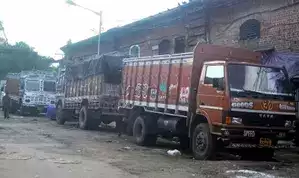 About 1.1 mn old medium & heavy CVs offer significant potential for scrappage: ICRA
About 1.1 mn old medium & heavy CVs offer significant potential for scrappage: ICRAAround 1.1 million medium and heavy commercial vehicles (M&HCVs), older than 15 years as of March 31 this year, offer a significant potential for scrappage, ratings agency ICRA said on Tuesday. While the actual scrappage could possibly be lower given the nature of usage of such vehicles, even if a proportion of these vehicles gets scrapped, it can support vehicle sales to some extent by spurring replacement demand, it said.
The Voluntary Vehicle Fleet Modernisation Programme or the Scrappage Policy, announced in March 2021, is being implemented in phases, with effect from April 1 last year.
While the first phase of the policy proposed to mandatorily scrap government vehicles older than 15 years, the second phase, which started on June 1 this year, mandates scrapping on the basis of fitness of the vehicle rather than age, and as such, is more voluntary in nature.
ICRA also projects an additional around 5.7 lakh vehicles to cross the 15-year age threshold by March 2027, along with over 9 lakh government vehicles proposed to be mandatorily scrapped under the first phase, and thus it offers a significant replacement demand potential for the automotive industry.
Scrappage potential in other segments is limited, considering the limited usage of two-wheelers, passenger vehicles and light commercial vehicles (LCVs) beyond 15 years, according to the rating agency.
However, as of August 31, 2024, the registered vehicle scrapping facilities (RVSFs) had received only 44,803 private scrap applications and 41,432 government scrap applications (including defence/impound scrap applications), it stated.
"The Vehicle Scrappage Policy has the potential to drive multiple benefits over the long term. While it will aid in reducing air pollution as older polluting vehicles get scrapped, it will also drive fleet modernisation programmes, in turn, supporting the auto industry volumes. ICRA also expects a considerable reduction in scrap imports and raw material costs for automotive original equipment manufacturers (OEMs) through recycling of metals under the Scrappage Policy framework," said Kinjal Shah, Senior Vice President and co-group head for corporate ratings at ICRA.
Implementation of the Vehicle Scrappage Policy, however, faces several challenges, which have slowed down its pace of implementation, she said, adding the limited network of RVSFs at present, inadequate incentives, lack of awareness about this policy, particularly among private vehicle owners, and issues related to registration date criteria are a few factors that have hindered the rapid implementation of the policy.
While several countries in North America and the Western European region have incentivised vehicle scrappages, mainly in the form of monetary compensations, India's implementation of the Vehicular Scrappage Policy comprises voluntary incentives (such as discounts, road tax rebates, registration fee waivers, etc.) and mandatory dis-incentives (such as mandatory fitness tests, imposition of green tax, hike in renewal fees for older vehicles, among others), ICRA said.
